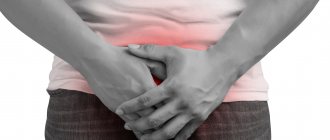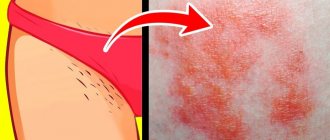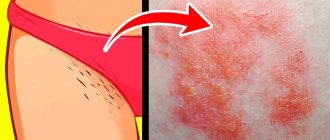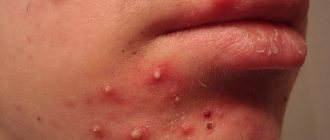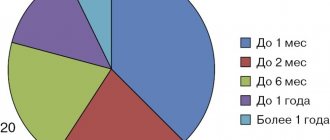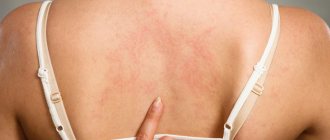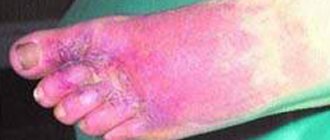Itching after sexual intercourse can occur in men and women for various reasons, and this symptom cannot be ignored - you need to consult a doctor (gynecologist, dermatovenerologist or urologist). The doctor will conduct an examination, take swabs from the mucous membrane of the genital organs and refer you for the necessary tests.
If you endure discomfort or self-medicate, the disease will become chronic, which is difficult to treat, or complications will arise, including infertility. So don’t wait for the itching and burning to disappear and contact a specialist.
Reason number 1 – thrush!
Most often, itching after sexual intercourse is caused by thrush (candidiasis). The disease is a fungal infection that appears when there is a pathological increase in opportunistic fungi of the genus Candida. These microorganisms are present in the biocenosis of the body of every healthy person, however, they actively reproduce and exhibit their pathogenic effect during the period of a general decrease in immunity, with problems with hormonal levels, after taking antibiotics. A characteristic feature of thrush is frequent relapses (up to several times a year).
Actively multiplying on the surface of the vaginal mucosa, microorganisms cause inflammation. Sexual intercourse provokes irritation of the inflamed mucous membrane and leads to more acute pain, itching or burning in the vagina.
Why does a burning sensation occur in the vagina?
How to identify thrush? There are several sure signs of candidiasis that a woman who notices itching after intimacy with a sexual partner can identify:
- curdled discharge with a sour odor, which may become more abundant after sexual intercourse;
- frequent itching in the vaginal area, which can be provoked not only by sex, but also by ordinary hygiene products;
- Possible pain during sexual intercourse or urination.
To treat thrush and eliminate itching after sexual intercourse, you should consult a doctor. Today there are many highly effective antifungal drugs that act locally. The course of treatment, as a rule, does not exceed 10-14 days. However, to prevent relapse, a course of treatment should be prescribed to both sexual partners, and after completion of treatment, a course of restorative therapy is recommended.
Features of examination in the presence of vaginal itching
What to do if there is itching in the vagina? First, determine its cause.
For this purpose, a comprehensive examination is used to identify not only infectious pathogens, but also other provoking factors.
The examination plan necessarily includes ELISA and PCR tests, which make it possible to accurately determine the pathogenic microorganism.
The standard diagnostic mechanism includes:
- blood and urine tests;
- advanced biochemistry to determine the activity of the inflammatory process and the involvement of other organs and systems;
- PCR for STDs;
- ELISA and PCR for herpes, other specific pathogens in agreement with the attending physician;
- scrapings from the anus or skin folds;
- urine culture for flora;
- standard genital tract smear, as well as PCR testing;
- Ultrasound of the pelvis.
When identifying microorganisms and diagnosing infectious inflammation of the vulva, control tests after treatment must be examined.
This ensures the prevention of relapses and guarantees the destruction of the pathogen.
If a woman has vaginal itching due to allergies, then a search for the irritating antigen is carried out using skin testing.
One test, even the best one, to identify the causes of vaginal itching will not help to accurately identify the problem.
A comprehensive examination is required.
Where to go for diagnostics?
You should choose a medical institution that has sufficient diagnostic potential and qualified personnel.
Since most often the problem is associated with sexually transmitted diseases, a dermatovenerological dispensary is best suited.
Here you can also learn how to prepare for specific tests.
If we talk about which doctor treats and examines patients, then it is preferable to choose a dermatovenerologist or gynecologist.
Reason number 2 – infections
Other infections that can cause itching after sex are trichomoniasis and bacterial vaginosis. In the first case, a woman may notice a greenish discharge, the appearance of which is accompanied by an unpleasant putrefactive odor. If such a symptom occurs, you should not delay contacting a specialist who will prescribe effective treatment.
Itching after intercourse
Bacterial vaginosis is a disruption of the normal microflora that populates the vaginal mucosa. As a rule, tests show an increased number of gardnerella and a decrease in the volume of beneficial lactobacilli.
Both cases are a direct indication for an in-person consultation with a gynecologist.
Expert opinion
Both women and men must undergo the examination. It is extremely important to do this even if the intimate partner does not complain of unusual discharge from the urethra or rash on the penis. This is due to the fact that the manifestations of some STDs in men are less pronounced than in women.
Obstetrician-gynecologist of the highest category Oksana Anatolyevna Gartleb
Cystitis at any age
An acute attack of cystitis after sexual intercourse can occur at any age. Decades ago, when women maintained their virginity until marriage, cystitis that occurred after sexual intercourse was called the “honeymoon disease.”
At the present time, the fact is that no matter what your age, if the contact took place after a long break, the meeting was too active or sex happened with a new partner, you are not immune from the development of acute cystitis.
Reason number 3 – allergies
Women who are prone to all sorts of allergic reactions may experience itching after sex when using various moisturizers, lubricants and barrier contraceptives (condoms). As a rule, irritation occurs due to a specific component: fragrance, disinfectant, latex. In this case, it is recommended to choose a neutral contraceptive that will not cause such symptoms, as well as use special restorative agents to quickly eliminate discomfort. The role of such a product can be the intimate gel lubricant Ginocomfort, developed by specialists of the pharmaceutical company VERTEX and having the appropriate documents and certificates.
One of the reasons for itching after sex may be skin irritation
Instrumental diagnosis of cystitis
Instrumental diagnostics, as the name suggests, is carried out using instruments. Cystitis after sex can be confirmed in the following ways:
- Kidney ultrasound
- Ultrasound of the bladder
- Ultrasound of the pelvic organs
- Cystoscopy of the bladder in women
Ultrasound examination to detect signs of inflammation in the bladder and kidneys, uterus and its appendages.
Cystoscopy is an examination of the urinary tract using a special optical system to determine the volume and depth of damage to the bladder mucosa. (more details...)
Reason number 4 – skin irritation
Itching after intimacy can be caused by irritation on the labia caused by depilation or hygiene procedures. Too aggressive detergents that dry out the mucous membrane (as well as depilation) provoke damage to the skin, burning, and peeling. In this case, it is worth using special mild sedatives and avoiding intimacy after hygiene procedures.
It is worth paying attention to the fact that microcracks can occur not only due to mechanical damage from razors, but also after rough sexual intercourse. In this case, the feeling of itching or burning can also be relieved with the help of restoring and healing gels.
Medications
The main treatment for postcoital cystitis is primarily aimed at blocking the spread of infection. Antibacterial therapy helps with this.
The main treatment of cystitis is supplemented with medications that help reduce the unpleasant manifestations of the disease and normalize the functioning of the urinary system - painkillers, herbal medicines, immunostimulants, vitamin complexes.
In the treatment of inflammatory processes in the bladder, the administration of anti-inflammatory drugs through the urethra into the bladder (instillation) is often used.
Cystitis after sex with proper treatment and following all the doctor’s recommendations goes away within a week, but immunostimulating drugs, herbal medicines and vitamins should be taken longer (2-3 weeks).
With this disease, it is extremely important to complete the full course of therapy, otherwise cystitis will become chronic, and treatment of chronic pathology will be much more difficult.
Recommendations
Special moisturizing and restorative products that have a versatile therapeutic effect on the vaginal mucosa can help eliminate signs of irritation and inflammation:
- they help moisturize the vaginal mucosa, which will smooth out the symptoms of burning, itching or irritation caused by non-infectious causes;
- relieve inflammation, which may occur due to the aggressive development of microorganisms or excessive dryness;
- help restore the normal balance of vaginal microflora, disturbed as a result of hormonal imbalances or taking antibiotics;
- prevent the occurrence of symptoms of itching and burning after sexual intercourse, if they previously occurred.
To eliminate itching after sexual intercourse, we recommend using Ginocomfort intimate gels - moisturizing or restorative (depending on the cause of the problem). The products were created by specialists from the pharmaceutical company VERTEX, have the necessary documents and certificates, and also underwent clinical studies under the leadership of Ignatovsky A.V. and Sokolovsky E.V. Testing of the products has proven their high efficiency and safety for health.
As a rule, moisturizing and restorative products for women's intimate health can be used daily. Such drugs will be an excellent prevention of problems in the intimate area, of course, in the absence of serious infectious diseases. In this case, an urgent visit to an experienced gynecologist is recommended.
Traditional treatment
Traditional medicine is used to remove inflammatory processes in the bladder, and this is only possible after prior consultation with a specialist. One of the most common methods in folk medicine is to use a heating pad or hot bottle. Yes, there really is relief, but! only for a while, because the cause has not been eliminated, and the bacteria in the bladder has not disappeared.
It is worth remembering that cystitis after sex requires an integrated approach and should include the use of antibiotics, antispasmodics, uroseptics and other medications.
It is important to follow a home regime, diet and drink plenty of fluids. So cold, the use of cold drinks, caffeine, and spicy foods aggravate the symptoms of the disease.
Symptoms of STIs: itching after sex, video
Urologist-dermatovenereologist, doctor of the highest category, Evgeniy Aleksandrovich Volokhov talks about itching after sexual intercourse. Source – Clinic Private Practice
Literature:
Sources:
- MODERN PRINCIPLES OF DIAGNOSIS AND TREATMENT OF VAGINAL CANDIDIASIS. Evseev A.A. // Bulletin of reproductive health. – 2009. – June. – pp. 20-25.
- FROM THE EXPERIENCE OF TREATING BACTERIAL VAGINOSIS. Gabdullina L.R., Vorobyova E.P. // Bulletin of modern clinical medicine. – 2012. – No. 1. – pp. 40-42.
- Vulvovaginal candidiasis: etiology, diagnosis, treatment. Kisina V.I. // Doctor. 2009. - 1. - pp. 13–15.
- Vulvovaginal candidiasis: a look at the problem. Tikhomirov A.L., Oleinik Ch.G. // Gynecology. - 2005. - 1. - pp. 29–34.
- Chronic recurrent vulvovaginal candidiasis: principles of diagnosis and treatment options. Bayramova G.R. // Obstetrics and gynecology. - 2008. - 6. - pp. 64–66.
- https://www.healthline.com/health/itching-after-sex
- https://www.medicalnewstoday.com/articles/322483.php
- https://medicalj-center.info/diseases/gynecology/why-torturing-itching-after-sexual-intercourse.html
Pathogenesis
The mechanism of formation of vulvar itching is based on the peculiarities of the innervation of the perineum, labia minora and labia majora. The branches of the iliac, pudendal, femoral and rectal nerves approach this area. When various stimuli are applied to the endings of unmyelinated C-fibers, poorly differentiated impulses, perceived as itching, tingling, burning and even pain, enter the sensitive zone of the cerebral cortex through the spinal cord.
The nature of the stimulus is usually determined by the immediate cause of the pathology. These may be drying secretions, local changes in the mucosa, metabolites, thermal, mechanical and chemical factors. Sometimes the action of irritants leads to the release of histamine, causing swelling and itching in the affected area. The pathogenesis of the disorder in mental disorders is apparently associated with a decrease in the threshold of sensitivity and increased excitability of brain structures.
Popular questions
Hello!
Every time after sex, a clear discharge appears with an unpleasant sour odor. After taking a shower the smell disappears. And during the day the usual clear discharge is observed. Is this the norm? Or is it still worth seeing a doctor? Hello! If these discharges do not cause a burning sensation, itching, or irritation, then they are considered normal. After contact, you can use Gynocomfort intimate hygiene gel prophylactically, which will help you cope with unpleasant sensations more quickly.
Good afternoon, during sex, sometimes with a condom, sometimes without, I feel a burning sensation in the vagina, what do you recommend?
Hello! Most often, such sensations appear due to insufficient hydration in the genital tract, so use an additional lubricant before contact. For this purpose, the use of Ginocomfort gel with mallow extract is suitable. A distinctive feature from other similar products is that it contains components. having an anti-inflammatory, regenerating effect in case of microtrauma of the mucous membranes. The gel is introduced into the genital tract using an applicator immediately before contact.
Hello. During the ovulation period, itching of the outer part of the vagina appeared. I'm afraid it's an allergy to panty liners. The pharmacy recommended the restorative intimate gel gynocomfort - can it not only be administered intravaginally, but also lubricate external areas of itching? And how long should the course of treatment last? Thank you
Hello! In case of an allergic reaction and inflammation, it is better to use Ginocomfort gel with mallow extract. The product can only be applied topically.
Hello! I have itching at the vaginal opening. Itching does not cause much discomfort. There are some white pimples or something similar on the labia. Itching appeared in the last days of menstruation. There was no sexual contact in the near future. I beg you, help! What could it be? And what will help with the itching? What am I supposed to do? Thank you!
Hello!
Itching can be caused by an allergic reaction to personal hygiene products used during menstruation or be a consequence of an infectious process, such as condylomatosis. You need to see a specialist as soon as possible and clarify the nature of the changes. At this stage, I recommend using Ginocomfort gel with mallow extract, which will relieve swelling and reduce itching, and in the future will help restore the mucous membrane. For an accurate diagnosis, contact a specialist
How to cure vaginal itching of infectious and other origins
Treatment of vaginal itching in most situations is unthinkable without eliminating the causative agent of the disease.
Therapeutic interventions are usually carried out on an outpatient basis, that is, at home.
The principle of dual effects on pathogenic microorganisms is used - through local administration of drugs and oral administration of drugs.
In practice, the following drugs are most often prescribed:
- antiseptic suppositories for vaginal itching containing chlorhexidine or broad-spectrum antibiotics;
- topical ointments or creams;
- douching with mildly irritating antiseptic solutions (miramistin, chlorhexidine, potassium permanganate);
- antibacterial drugs inside;
- Sometimes antibiotics are administered parenterally for severe combined infections.
If we talk about which suppositories are used for vaginal itching, the specific choice depends on the decision of the attending physician.
More often, Hexicon, Klion or combination drugs are prescribed (Terzhinan, Polygynax and others).
The basis of suppositories is often metronidazole or clotrimazole, which are highly active against vaginal itching of infectious origin.
"Terzhinan" and other combination drugs for vaginal itching are used for mixed infections.
In addition to antiseptic, they have an anti-edematous effect, which speeds up the onset of recovery.
If a woman has pain in peeing and there is also itching in the vagina, then vaginitis is complicated by cystitis.
This means that the infection has spread to the urinary tract.
Only one cream for vaginal itching will not help; systemic antimicrobial therapy is needed.
Broad-spectrum antibiotics are prescribed, often together with metronidazole.
If vaginal itching occurs in the morning, the presence of worms in the intestines should be ruled out.
If they are detected, anthelmintic drugs are additionally used.
An alarming symptom is vaginal itching at night, which especially interferes with sleep.
It is important to immediately seek help from a doctor if such a clinical picture develops.
Itching and cracks in the vagina are often a sign of atrophic changes.
Therapeutic tactics are slightly different from those used to identify pathogenic microorganisms.
The principles of therapy are usually the following:
- hormone replacement therapy;
- progesterone-based suppositories (with the drug Utrozhestan, the itching may initially increase);
- glucocorticosteroids externally, especially when combined with allergies (the drug Akriderm for vaginal itching is most often used);
- correction of concomitant pathologies, especially diabetes;
- antiseptics when an infection occurs on a thinned mucous membrane (chlorhexidine is prescribed for vaginal itching in parallel with HRT for a short course).
The duration of therapy depends on the decision of the attending physician, however, modern treatment regimens include taking hormonal drugs for many years.
If the vagina is swollen and itching appears, then antiallergic treatment is probably needed.
Typically, doctors prescribe inexpensive medications for vaginal itching based on glucocorticosteroids or antihistamines.
With HIV, as well as vaginal itching before childbirth, requires more attention, since the overall resistance of the body is reduced.
Complications
To relieve intense discomfort, women often rub or scratch the itchy areas. Mechanical stress increases irritation, which leads to the formation of scratching, erosion, and ulceration. Infection of the mucous membrane aggravates the course of the underlying pathology due to the addition of vulvitis. In chronic somatic, endocrine and inflammatory genital diseases, dysplastic and neoplastic processes may occur against the background of prolonged irritation of the vulvar mucosa. Constant discomfort in the genital area causes the development of anxiety-depressive, hypochondriacal and other neurotic disorders.
Vulvoscopy

